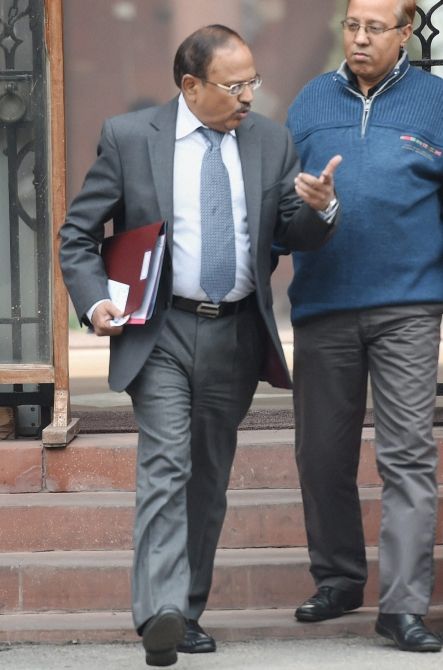'Defence does not new 'planning commissions'; it needs an implementation commission.'
Ajai Shukla reports.

IMAGE: National Security Adviser Ajit Doval.
Successive defence ministries have adopted the adage: When nothing else is working, set up a committee.
Give it a sweeping mandate. Demand a comprehensive report.
Then, implement a few recommendations and put the important ones in cold storage.
Over the preceding two decades, two National Democratic Alliance and two United Progressive Alliance governments have done exactly this.
In 1999, the Kargil Review Committee reported on defence reform, with a group of ministers reiterating many of its key recommendations in 2001.
In 2005-2006, the Vijay Kelkar committee submitted its seminal report on revitalising defence production.
In 2012, it was the Naresh Chandra Task Force and in 2016 the Shekatkar Committee.
Many of their key recommendations were related to higher defence planning. None were implemented except the semi-empowered Integrated Defence Staff was set up half-heatedly in 2004.
The integration of the military services (army, navy and air force) headquarters and the civilian ministry of defence remains a mirage.
Now, in its penultimate year and staring at a worrying lack of achievement in defence planning, procurement and force structuring, the current government has constituted yet another body called the Defence Planning Committee.
Hailed as 'overarching' and a 'super-committee' by some news outlets, the DPC, headed by National Security Advisor Ajit Doval, comprises officials from several government departments that feed into national security.
Unlike earlier committees, this one is staffed by senior serving officials.
There are the three service chiefs (with the senior-most being the ex-officio Chairman of the Chiefs of Staff Committee), and the secretaries of defence, external affairs and expenditure.
The principal secretary in the prime minister's office is a part as well.
The idea of such a committee, even the name, is not original.
In 1978, the Morarji Desai government set up a Defence Planning Committee under the Cabinet secretary.
It included the secretary in the PMO and those of defence, defence production, external affairs, finance and the planning commission.
After achieving little, the 1978 DPC faded away.
The current DPC's mandate is expansive. It will prepare draft reports on national security strategy and international defence engagement.
It will prepare a roadmap for building a defence manufacturing eco-system and a strategy to boost defence exports.
According to media reports, the DPC will submit its reports to Defence Minister Nirmala Sitharaman.
It is already being whispered that the DPC will upend established decision-making structures.
While Sitharaman remains the de jure head, government insiders clearly see a shift in influence towards the National Security Council and the PMO. They say that was the trend anyway.
The Indian Express has commented that bringing together key officials on one platform 'can obviate the usual bureaucratic problem of important issues being moved on file only, to be debated in silos in different ministries.'
However, the DPC is only a deliberative body. Its decisions would still require to be moved on file and cleared, and will be subject to implementation delays.
"Bringing additional departments and bureaucratic structures into decision-making is seldom a good way of speeding up things," says a senior defence ministry bureaucrat, speaking on the condition of anonymity.
"We have planners and thinkers aplenty. The problem is unlocking implementation logjams. Defence does not new 'planning commissions'; it needs an implementation commission," says a defence industry chief executive.
"There is already a Defence Production Policy of 2018 that envisions creating a defence manufacturing eco-system and exponentially increasing defence exports. There is a Defence Procurement Procedure as well. Will the DPC work with existing rules, or create its own framework?" wonders the defence ministry official.
The big plus in the DPC could be a new, holistic, approach to national security planning, enabling a combination of diplomacy, defence and economic means to be deployed in managing threats like a two-front war, or a naval blockade of Indian ports.
Another positive is the inclusion of civilian planners into the formulation of military doctrines and objectives. Currently, this is entirely left to military planners.
'One reason we don't know where Indian civilians stand on the army's Cold Start Doctrine is because there was no formal or informal process for civilians to review service doctrines. This new (DPC) appears to provide just such a forum. That's good!' tweeted Christopher Clary, a US-based academic who studies Indian security and strategy.
According to media reports, the DPC will have four sub-committees dealing with: Policy and strategy; plans, capability development; defence diplomacy and defence manufacturing eco-system.











